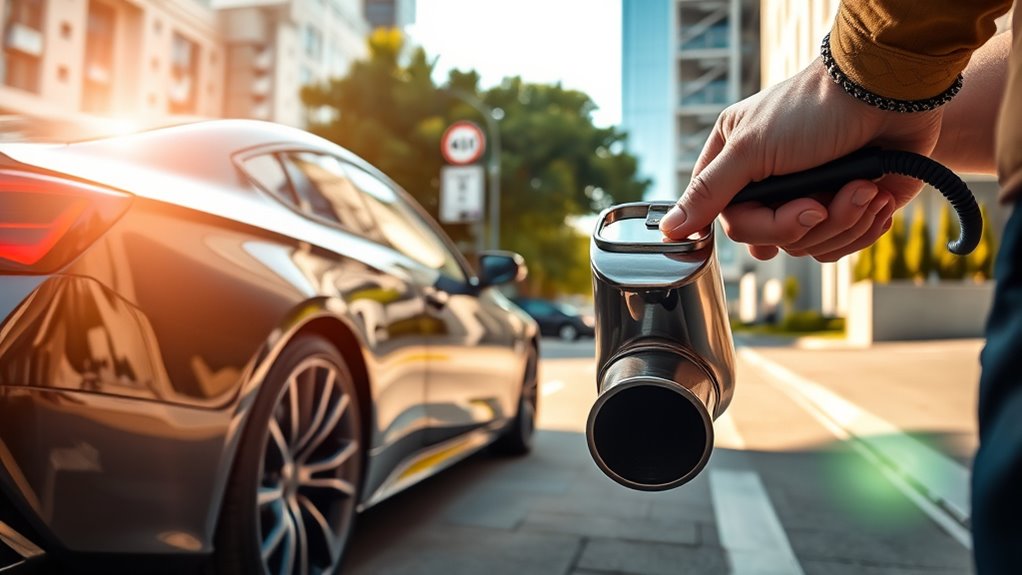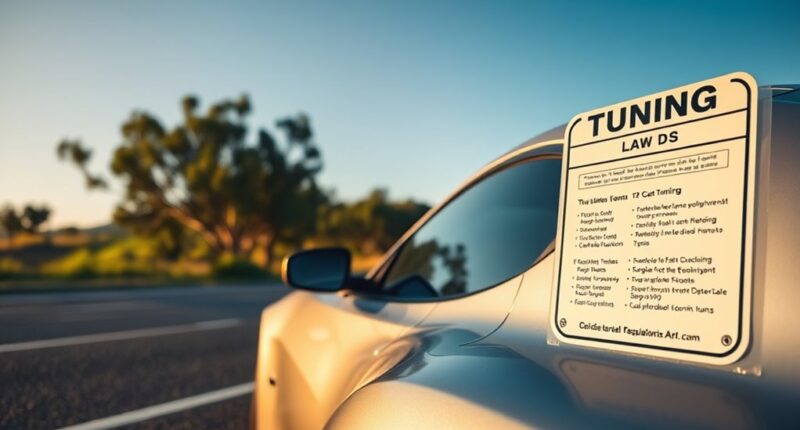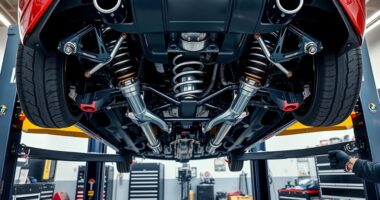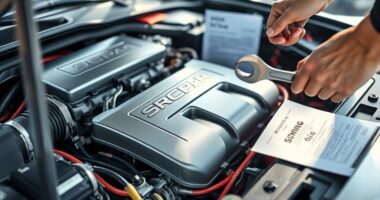In Australia, vehicle tuning laws are strict and vary by state. You need to make certain modifications like exhaust, suspension, and engine tweaks meet safety and emission standards set by authorities. Many changes require approval from certified engineers or certification bodies before you register your vehicle. Failing to comply can lead to hefty fines, vehicle impoundment, or legal issues. To stay on the right side of law, it’s crucial to understand the regulations—there’s more to keep in mind if you keep exploring.
Key Takeaways
- All vehicle modifications must comply with Australian Design Rules (ADRs) and safety standards.
- Exhaust and suspension changes require approval from certified engineers; illegal modifications can lead to fines or vehicle rejection.
- Emission modifications must meet Australian emission standards and often need certification for legality.
- Regional enforcement varies, with police inspections and surveillance ensuring compliance; penalties include fines and vehicle impoundment.
- Keep detailed records of all modifications, approvals, and certifications to ensure ongoing legal compliance.
Understanding Vehicle Modification Regulations in Australia

Have you ever wondered what rules govern vehicle modifications in Australia? The answer depends on the type of change you want to make.
Generally, all modifications must meet safety standards and not compromise vehicle compliance. You need to check if your modifications align with the Australian Design Rules (ADRs), which set safety and environmental standards.
All vehicle modifications must meet safety standards and comply with Australian Design Rules (ADRs).
Some modifications, like changing the suspension or exhaust, require approval from certified engineers and may need to be inspected and certified before registration. Additionally, understanding the tiny house designs principles can inspire creative and compliant vehicle conversions for mobile living.
It’s also essential to inform your local transport authority about significant changes.
Failing to follow these regulations can lead to fines, vehicle rejection, or even invalidating your insurance.
Always research local laws and seek professional advice to ensure your modifications are legal and safe.
Key Differences Between State and Federal Tuning Laws

You should be aware that state and federal tuning laws often have different regulations and enforcement levels. Licensing and certification requirements can vary depending on where you are, impacting how you modify your vehicle. Incorporating testing methodologies can help ensure compliance with applicable laws and standards. Penalties for non-compliance also differ, so understanding these distinctions helps you stay within the law. Additionally, staying informed about legal updates can prevent inadvertent violations and ensure your modifications remain compliant. Recognizing how relationship patterns influence legal requirements can further assist in navigating complex regulations.
Jurisdictional Regulations Variance
While federal laws establish broad standards for vehicle tuning across Australia, individual states and territories often implement their own regulations that can markedly differ. These variations can impact your tuning projects considerably. For example:
- Noise restrictions may vary, affecting exhaust modifications
- Emission standards can differ, influencing engine tuning
- Inspection and approval processes might be more rigorous locally
- Registration requirements could include specific tuning-related documentation
Understanding these jurisdictional differences helps you avoid legal issues and guarantees your modifications stay compliant. It’s vital to research your specific state or territory’s regulations before starting any tuning work. Additionally, awareness of local regulations related to noise and emissions can help prevent inadvertent violations. Notably, jurisdictional regulation differences can influence the type of modifications permitted and the compliance process. Moreover, considering emission standards and their impact on tuning options ensures your vehicle remains environmentally compliant. Being aware of compliance procedures can streamline the approval process and reduce delays. To further ensure adherence, consulting with local authorities or certified tuning professionals can provide valuable guidance on the regulatory requirements.
Staying informed guarantees you’re within the law and prevents costly legal or insurance complications down the line.
Licensing and Certification Requirements
Understanding licensing and certification requirements is crucial because they differ markedly between federal and state laws. At the federal level, you typically need specific certifications to perform vehicle modifications legally, especially if those changes impact emissions or safety standards. These certifications often require passing exams and maintaining records of your work. Beauty hours today are not relevant here, but it’s important to note that licensing requirements can also be influenced by local store hours and availability. Meanwhile, state laws may impose additional licensing, with some regions requiring you to hold a specialized tuner’s license or registration before modifying vehicles. Each state’s Department of Transport or equivalent authority sets these rules, which can vary substantially. Failing to meet licensing or certification requirements can lead to fines or legal action. Consequently, it’s important to verify the exact licensing criteria in your state and ensure you comply before starting any tuning work.
Enforcement and Penalties
Enforcement of tuning laws in Australia varies considerably between federal and state levels, with each jurisdiction adopting different strategies to guarantee compliance.
At the federal level, authorities focus on strict surveillance and penalties for illegal modifications, including hefty fines and vehicle impoundments. The Dog names approach emphasizes a comprehensive enforcement framework to deter illegal tuning practices effectively. This federal strategy is complemented by the use of advanced monitoring technologies to track illegal modifications.
States may have more localized enforcement, often relying on police inspections and roadside checks. Penalties differ markedly: some regions impose criminal charges, while others issue fines or suspension of registration. These regional differences highlight the importance of understanding regional enforcement to stay compliant. Additionally, awareness of specific state regulations can help vehicle owners better navigate local compliance requirements. It is also vital to stay informed about enforcement strategies to ensure adherence to the law and avoid penalties.
To stay compliant, you should be aware that:
- Federal agencies can impose large fines for illegal tuning
- State authorities conduct random inspections and roadside checks
- Violations can lead to vehicle impoundment or registration suspension
- Repeat offenders face escalating penalties and potential criminal charges
- Vetted – Grobal World emphasizes the importance of understanding regional enforcement differences to avoid legal issues.
Common Modifications and Their Legal Status

Many common vehicle modifications in Australia, such as changing exhaust systems, altering suspension heights, or installing aftermarket tuning chips, have specific legal statuses that you need to be aware of. Some modifications are legal if they meet safety and roadworthiness standards, while others are prohibited or require approval. For example, altering your exhaust might be legal if it complies with noise regulations, but raising your suspension too high may breach safety standards. Here’s a quick overview:
| Modification Type | Legal Status |
|---|---|
| Exhaust system changes | Usually legal if compliant with noise laws |
| Suspension alterations | Often illegal if unsafe or non-compliant |
| Tuning chips | Legal when approved and compliant |
Always check local regulations before making modifications, as regulatory compliance is essential to ensure your vehicle remains legal on the road. Staying informed about vehicle modification laws can help prevent fines or penalties. Understanding safety standards for modifications can also protect you from potential legal issues and ensure your vehicle’s performance and safety. Additionally, being aware of emission regulations is important to avoid modifications that could increase pollution beyond legal limits. Being familiar with inspection requirements can help you prepare your vehicle for compliance testing and avoid costly rejections.
Emission Standards and Compliance Requirements

Emission standards and compliance requirements in Australia set clear limits on the pollutants your vehicle can emit, guaranteeing it meets environmental and safety regulations. These standards help reduce air pollution and protect public health. Regular emissions testing is essential to verify compliance and avoid penalties. When tuning your vehicle, you must confirm modifications don’t exceed emission limits or compromise compliance. Failure to meet these standards can lead to fines, vehicle impoundment, or rejection during registration. Additionally, understanding nutrient deficiencies from diet choices can indirectly influence overall health and well-being, including the health of your hair. It is also important to stay informed about regulatory updates to ensure ongoing compliance with changing emission laws. Staying aware of vehicle modification regulations ensures that your vehicle remains compliant and safe on Australian roads. To stay compliant, consider consulting emissions testing centers to ensure your vehicle’s modifications meet all required standards. Key points to think about include: – Regular emissions testing to verify compliance – Ensuring aftermarket parts meet Australian standards – Maintaining documentation of modifications – Staying updated on evolving emission regulations
Approvals and Certification for Tuning Changes

Before making tuning changes, you need to guarantee your modifications are properly approved and certified. In Australia, any significant alterations to your vehicle’s engine or exhaust system must meet the standards set by the Australian Design Rules (ADR). You’ll need to work with an authorized engineer or a registered vehicle modifier who can assess your modifications and issue an approval certificate. This certification confirms your vehicle remains compliant with safety and emissions regulations. Additionally, some tuning adjustments may require a compliance plate or modification approval document to be issued and kept on record. Ensuring your modifications align with Waldorf Toys principles of quality and safety can also be beneficial in demonstrating compliance. Being aware of emissions standards is essential to ensure your tuning modifications do not exceed legal limits. Failing to secure the necessary approvals can lead to legal issues and potential vehicle inspection failures. Always ensure your tuning modifications are properly certified before proceeding.
Penalties and Consequences of Non-Compliance

Failing to comply with Australia’s tuning regulations can result in serious penalties that affect both your vehicle and your wallet. You risk hefty fines, vehicle impoundment, license suspension, and even criminal charges.
Non-compliance can also lead to your car failing safety inspections, making it illegal to drive. Here are some consequences you should be aware of:
- Significant fines that can reach thousands of dollars
- Impoundment of your vehicle until compliance is met
- Suspension or cancellation of your driving license
- Criminal charges for unsafe modifications
Ignoring the rules not only puts you at risk legally but also compromises safety on the road. Staying within legal boundaries is essential to avoid these costly and dangerous outcomes.
Tips for Staying Within Legal Boundaries

To stay within legal boundaries, you need to understand the local regulations that apply to tuning. Make sure you obtain any necessary certifications before making modifications.
Keep your records organized to prove compliance if needed. Staying informed and prepared helps you avoid penalties and enjoy your vehicle responsibly.
Understand Local Regulations
Understanding local regulations is vital to guarantee you’re operating within the legal boundaries when tuning laws in Australia. Laws can vary by state or territory, so it’s essential to research specific rules in your area.
Failing to comply can lead to fines, vehicle impoundment, or even legal trouble. To stay compliant, consider these key points:
- Check if modifications require approval from local authorities
- Understand emission standards and noise restrictions
- Know the limits on engine modifications and exhaust systems
- Keep records of any changes made for documentation purposes
Obtain Necessary Certifications
Obtaining the necessary certifications is a crucial step to guarantee your vehicle modifications stay within legal boundaries in Australia. Before making any significant changes, check if your modifications require approval from relevant authorities, such as the Australian Design Rules (ADR) or the Vehicle Standards Bulletin.
You may need certification from accredited engineers or inspection agencies to verify that your modifications meet safety and emissions standards. Failing to obtain proper certification can lead to fines, your vehicle being deemed illegal, or voided insurance coverage.
Always research the specific requirements for your vehicle type and modification scope. By securing the correct certifications, you ensure your vehicle remains street-legal and compliant with Australian laws.
Staying proactive with certifications helps prevent legal issues down the road.
Keep Records Organized
Keeping your records organized is essential for staying within legal boundaries when modifying your vehicle. Proper documentation helps prove compliance if authorities question your modifications. You should keep copies of all relevant certifications, receipts, and correspondence with regulators.
Record details like dates of modifications, parts used, and any inspections or approvals obtained. This ensures you can quickly provide proof if needed and avoid penalties.
To stay on top of your documentation, consider:
- Storing digital copies of all receipts and certifications
- Maintaining a log of modifications with dates and details
- Keeping correspondence with inspectors or certifiers
- Updating records after each modification or inspection
Being organized not only keeps you compliant but also protects you from fines or legal issues down the line.
Resources and Authorities to Consult for Tuning Laws

When steering tuning laws in Australia, you should start by consulting key government agencies and official resources that set and enforce these regulations. The primary authority is the Department of Infrastructure, Transport, Regional Development, Communications and the Arts, which oversees vehicle standards and modifications.
The Australian Government’s Federal Register of Legislation provides detailed laws and regulations related to vehicle tuning. Additionally, the Australian Vehicle Standards Rules specify technical requirements you must meet.
State and territory transport departments also regulate vehicle modifications within their jurisdictions, so check local laws.
For guidance, visit the Australian Competition and Consumer Commission (ACCC) website for consumer rights and compliance information.
Consulting these authorities helps ensure your tuning activities stay within legal boundaries and avoid penalties.
Frequently Asked Questions
How Do I Verify if My Vehicle Modifications Are Legal in Australia?
You want to know if your vehicle modifications are legal in Australia. First, check with your local state or territory’s transport authority because laws vary across regions.
Visit their official website or contact them directly to get clear guidelines.
You should also consult with licensed vehicle inspectors or certified mechanics who are familiar with Australian regulations.
Doing these steps guarantees your modifications meet legal standards and keep you safe on the road.
Are There Specific Tuning Laws for Electric Vehicles in Australia?
You might think electric vehicle tuning laws are a maze, but they’re actually straightforward. Australia doesn’t have specific laws targeting EV modifications yet.
However, you still need to make certain your upgrades comply with general safety and emissions standards.
Always check with local authorities and consult certified professionals to avoid legal trouble.
Staying informed is your best bet to keep your EV street-legal and safe on Australian roads.
Can I Get a Legal Exemption for Certain Tuning Modifications?
You might be able to get a legal exemption for certain tuning modifications, but it’s not straightforward. You’ll need to apply through your local transport authorities and demonstrate that your modifications meet safety and environmental standards.
Keep in mind, exemptions are rare and usually granted for specific reasons. Always check with local regulations before making any modifications, so you avoid penalties or vehicle confiscation.
How Often Are Vehicle Tuning Laws Updated in Australia?
You’re curious about how often vehicle tuning laws change in Australia. The truth is, these laws don’t update on a set schedule; instead, they evolve as regulations adapt to new technology and safety standards.
You should stay alert for updates from authorities like the Australian Government or transport agencies. Regularly checking official sources guarantees you’re always compliant and ready for any changes that might impact your tuning projects.
What Is the Process for Legal Approval of Aftermarket Tuning Parts?
To get aftermarket tuning parts legally approved, you start by ensuring they meet Australian safety and emissions standards.
You’ll need to submit your parts for testing and certification through authorized testing facilities or automotive authorities.
Once the parts pass the necessary inspections, you obtain approval or a compliance certificate.
This process helps you confirm your modifications are legal and won’t void your vehicle’s warranty or insurance.
Conclusion
Exploring Australia’s tuning laws can feel overwhelming, but staying informed is your best bet. Missing a regulation could mean costly penalties or even losing your ability to hit the road. Are you ready to tune your vehicle safely and legally? Keep digging, consult the right authorities, and don’t rush the process. The road ahead is yours—just make sure it’s a legal one. Your perfect, compliant ride is waiting—are you prepared to open it?









